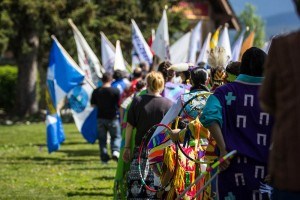
What is snowshoe jigging? Come and find out this Saturday as the Métis Nation of British Columbia hosts Jasper’s National Aboriginal Day celebrations.
National Aboriginal Day is an opportunity for all Canadians to recognize, honour and celebrate the many contributions of First Nations, Métis and Inuit people to our country, our province, and our park. This day was designated in 1996 by the Governor General, Romeo LeBlanc, and is celebrated in cities and communities from coast to coast to coast.
Since 2006, National Aboriginal Day has been a major event in Jasper. At that time, Parks Canada was beginning a journey of reconciliation with Aboriginal communities, acknowledging their traditional ties to the land in Jasper National Park. That year also marked the creation of the Jasper Aboriginal Forum—a bi-annual meeting of representatives from 20 to 25 Aboriginal groups and park managers to discuss issues and projects of mutual interest.
Through the work of the forum, an Aboriginal Cultural Area has been designated in the park; traditional land use studies and ceremonies have been initiated; and work is being carried out to create a cultural symbol that recognizes the many Aboriginal connections to the area.
Since the fur trade era, the history of Aboriginal people at Jasper House—the trading post established in 1813—has been well documented.
Oral history and archaeology paints a picture of even earlier Aboriginal history in the area. Many of the place names in Jasper come from First Nations languages and ancient stories.
The Athabasca River is a Stoney word for “where the reeds grow”. The Snaring River or Tapakwow Sipi comes from the story of a group who out-waited a pursuing war party by quietly snaring bighorn sheep uphill from the river (as one version of the story goes). The pursuers became impatient, abandoned their chase and returned home.
Some places, like Mount Tekarra, Mount Cardinal (and Pass), Jacques Lake, Adolphus Lake, Moberly bridge (and Flats), are named for First Nations and Métis men who guided early explorers. These men also cut and blazed many of the trails that visitors still enjoy today whether on foot, on horseback, travelling by car or riding the rails.
Today, Aboriginal Elders once again teach us about the importance of connections to the land—relationships between all living creatures, including people. The knowledge of the area’s plants and the preparation of traditional medicines is very important to Aboriginal cultures, and these skills are passed down through generations.
On National Aboriginal Day, join us in celebrating Canada’s diverse Aboriginal cultures and the significant contributions of Aboriginal peoples to this country—past, present and future.
This year the Métis Nation of British Columbia (MNBC) will lead the celebrations alongside other communities and independent presenters on Saturday, June 20 on the Information Centre Lawn from 10:30 a.m. to 4:30 p.m.
Still wondering about snowshoe jigging? Come and see for yourself at National Aboriginal Day.
Parks Canada
Special to the Fitzhugh
